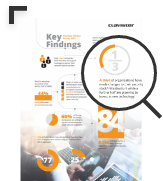How Tech Will Beat COVID-19

With medical research desperately searching for a cure to the Corona crisis, what may be our best hope in the meantime is for technology to save the day. Here’s how…
By now we’ve all become almost fatigued with the news cycle’s daily curves that grimly tell the tale of our times. That the COVID-19 virus is costing tens of thousands of lives, that it’s destroying economic prosperity and changing our fundamental freedoms of movement. The world’s scientific community is on a war time footing to find a cure. But they soberly admit that a vaccine is 6-18 months away. These are hard times to find hope in.
One place that is offering just such hope is technology where a range of innovations—from apps to solutions to help keep us productive while we social distance—are helping to beat COVID-19. Meet the software heroes that are becoming a new reality for our daily lives and may just become the new norm after the crisis passes.
Putting the power of into your hands
One major way that we’ll win against the virus is by being aptly informed. In this regard information apps with continual update widgets are proving effective. Apple’s launch of the COVID-19 app is designed to share the latest preventative information from the Center for Disease Control (CDC). It offers a series of health questions to determine your risk level as well as symptom diagnostics to help users judge when it’s time to seek medical help. Similarly, Covid Symptom Tracker—the third most downloaded app in the UK—is aiming for a million downloads in 24 hours to help users evaluate their symptoms and most importantly, temperature inputs.
There are also apps like MIT’s Private Kit: Safe Paths project which allows users to create a crowdsource community data system that shows users if they’ve been in contact with carriers of the virus and alerting others if they’re infected. This would help flatten the curve and follows a similar approach called Corona 100m, a South Korean app that helped that country turn the tide by showing citizens where infections were within a 100 metres of their geo location.
Remote working becomes the new norm
It’s projected that almost 50% of the world will be working from home during this period, a staggering challenge to our productivity and ability to stay effective.
Luckily, the cloud revolution has greatly helped prepare us for that as today’s productivity platforms like Office 365 and now Teams, Google Docs and other online collaborative environments are ready to accept the challenge of keeping us connected and humming along.
However, that connectivity cannot be without security as more and more reports show that remote working without it can have a massive impact on business continuity. Using firewalls at the worker’s home site, either virtually or by way of small appliance, is an important step with a strong requirement that these NGFWs be delivered by zero touch provisioning and services be elastically available in the cloud to scale up and out as needed. Clavister, a company based in Sweden, offers such products and more.
Additionally, having a Virtual Private Network (VPN) connection is key, a way to communicate and connect to your work’s network with an encrypted tunnel that stops cyber snooping and from having malware and spyware planted in your communications. Not all VPNs are created equal and when choosing one, make sure that they’re built security from the ground up like using IKEv2 and other security technologies.
Last but not least for remote working to be secure, users need to authenticate and prove that they are who they say they are. With passwords being continual stolen and users working outside of the network, it becomes key to implement multifactor authentication. We predict that this will be a growing trend that—long after corona has been defeated—will stay with us as we remote work a larger percentage of our time.
Conf calling for all
Sure, we’ve all done our time on Skype but since the COVID-19 crisis, video conferencing demand has exploded. The seasoned business solutions like Webex suddenly found themselves usurped by a host of new companies, offering video conferencing that was more dynamic and at better price points.
While there are off the shelf solutions like Google Hangouts and Skype for Business and increasingly, teams on the entry to mid-level org side, Zoom has made a big splash as the SMEs choice for vid conferencing along with GoToMeeting and GoToWebinar for slightly larger organizations. With the isolation that can come with remote working, a platform that has an intuitive layout of participants and tools for screen sharing and chatting, one with low latency and one that has good compatibility with the security as mentioned above is critical. In fact, we predict—once the crisis subsides—that the very nature of work (everyone gathering in a central office to work in adjacent cubicles) may be seriously reconsidered as remote working, powered by the intimacy of video conferencing, becomes the post COVID-19 norm.
Then there’s what tech does best: innovates
Last but not least, tech will save us from COVID-19 by being, well techy; throwing great brains and code at a problem. Devpost, one of the world’s biggest online hackathons, will turn their attention to the virus hoping to generate “software solutions that drive social impact,” by organizing a COVID-19 Global Hackathon to try to fight the ongoing coronavirus pandemic.
Additionally, a community of cybersecurity professionals calling itself the CTI League is helping hospitals to ward off hackers and other bad cyberactors. With an army of coders from around the world including Defcon, they’re going to code solutions to safeguard critical infrastructures from attack and harm.
Last but not least, AI is coming to the rescue as a major tool in the fight against corona, both in the search for a vaccine but as a predictive tool that uses big data for prescriptive analytic. For AI’s contribution to vaccine heavy lifting, look no further than British startup Exscienta who’s using AI to accelerate vaccine development from a normal five year project to 18 months. According to chief executive Prof Andrew Hopkins AI will help develop antibodies and vaccines for the Covid-19 virus as well as scan through existing drugs to see if any could be repurposed. He also believes that AI will design a drug to fight both the current and future coronavirus outbreaks. Google-owned AI company DeepMind, meanwhile, has used its AlphaFold system to release structure predictions of several proteins associated with the virus.
Don’t worry world, tech has got your back on this one!
Read more about how Elastic Security for Remote Working will help you stay connected and protected








